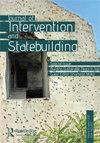Considering Statebuilding, Publishing Statebuilding – On Being an Editor in a Changing Field
IF 2.3
2区 社会学
Q1 INTERNATIONAL RELATIONS
引用次数: 0
Abstract
Statebuilding has waned in importance, at least when we are looking at the two decades following the Balkans wars. Building a state which would provide a platform for peaceful resolution of conflicts was widely understood as a remedy to escape cycles of violence and counterviolence. The ‘multi-functional’ state, of course, was viewed as a somewhat a-political unit, not restricted to merely holding a monopoly to the legitimate use of violence; it would be manned (predominantly) with representatives who were technocratically able but bore little personal ambition (Ghani and Lockhart 2007). International interventions were meant to help, or enforce, building such a state, and how-to knowledge was in demand. When the Journal of Intervention and Statebuilding was founded and first published in 2007, with three issues per year, the balance between academic analysis and practical requirements was hence very important (Chandler, Chesterman, and Laakso 2007) – and the requirement to bring practice and conceptual thinking and political into a productive dialogue is more valid than ever today. At the same time, it became clear over the years in contributions of many clever scholars that there were fundamental flaws in a liberal world view that guided action in international interventions, which not inevitably but almost naturally contained components of statebuilding (Jahn 2007a, 2007b; Richmond 2009; Goodhand andWalton 2009; Mac Ginty 2012; Greener 2012; Augestad Knudsen 2013; Charbonneau and Sears 2014; Philipsen 2014; Paffenholz 2021; see also Special Issues guest edited by Gabay and Death 2012; Mullin and Pallister-Wilkins 2015). Of the many findings, the most important were that, to many statebuilders’ surprise, statebuilding was political, not technocratic; politicians in intervened countries followed their own political considerations, in the process not necessarily supporting the norms the interveners claimed to hold dear; interveners themselves had narrow interests, career projections and organizational logics to follow rather than pursue lofty ideals they prided themselves officially to be supporting. After all, politics remained local, recognized in the local turn debate and its inherent limits (Roberts 2013; Chandler 2015; Abboud 2021; Randazzo 2021). The initial diagnosis, namely that in conflict settings the state which was unable to balance societal groups’ interest within its own institutions was somewhat deficient was correct. The reverse conclusion, that functioning institutions would prevent violent conflicts was not (Hehir 2007). Hence, statebuilding was not the ideal cure for violence, programmatically, even though several explanatory factors were routinely identified for dysfunctional, or fragile, statehood (Lemay-Hébert 2009; Barakat and Larson 2014): a lack of democratic participation in decision-making (Kurki 2011); a lack of monopoly of violence (Ahram 2011; see Special Issues guest edited by Berit Bliesemann de Guevara 2010; Schmelzle and Stollenwerk 2018); problematic security institutions (Sedra 2018; see Special Issues guest edited by Jackson 2018; Ansorg and Gordon 2019); a lack of economic development (Emmanuel and Rothchild 2007); abundance of resources (Kühn 2008; Bridoux 2011; Schwarz and de Corral 2013); lack of education (Shah, Paulson, and Couch 2020); or external meddling (Heathershaw 2008), colonial legacies (Gruffydd Jones 2012; Kühn 2016; Eriksson Baaz and Stern 2017; Nakagawa 2018),思考国家建设,出版建设——论在变革领域做编辑
国家建设的重要性已经减弱,至少当我们审视巴尔干战争后的20年时是这样。人们普遍认为,建立一个能够为和平解决冲突提供平台的国家是摆脱暴力和反暴力循环的一种补救办法。当然,“多功能”国家在某种程度上被视为一个政治单位,而不仅仅局限于垄断合法使用暴力;它将由(主要)有技术能力但几乎没有个人野心的代表组成(Ghani和Lockhart,2007年)。国际干预旨在帮助或强制建立这样一个国家,并且需要如何掌握知识。当《干预与国家建设杂志》于2007年创刊并首次出版时,每年出版三期,因此学术分析和实践要求之间的平衡非常重要(Chandler、Chesterman和Laakso,2007年),将实践、概念思维和政治纳入富有成效的对话的要求在今天比以往任何时候都更加有效。与此同时,多年来,许多聪明的学者的贡献表明,指导国际干预行动的自由主义世界观存在根本缺陷,其中并非不可避免但几乎自然地包含了国家建设的组成部分(Jahn 2007a,2007b;里士满2009;古德汉德和沃尔顿2009;Mac Ginty 2012;Greener 2012;Augstad Knudsen 2013;Charbonneau和Sears 2014;Philipsen 2014;Paffenholz 2021;另见Gabay和Death客座编辑的《特刊》2012;Mullin和Pallister Wilkins 2015)。在众多发现中,最重要的是,令许多建州者惊讶的是,建州是政治性的,而不是技术官僚;被干预国家的政治家遵循自己的政治考虑,在这个过程中不一定支持干预者声称珍视的规范;干预者本身有狭隘的兴趣、职业规划和组织逻辑需要遵循,而不是追求他们引以为豪的官方支持的崇高理想。毕竟,政治仍然是地方性的,在地方转向辩论中得到了承认,并受到了其固有的限制(Roberts 2013;Chandler 2015;Abboud 2021;Randazzo 2021)。最初的诊断是正确的,即在冲突环境中,国家无法在自己的机构内平衡社会群体的利益。相反的结论是,运作良好的机构将防止暴力冲突,但事实并非如此(Hehir,2007年)。因此,从程序上讲,国家建设并不是解决暴力的理想方法,尽管经常发现几个解释性因素导致国家功能失调或脆弱(Lemay-Hébert,2009年;巴拉卡特和拉森,2014年):决策缺乏民主参与(Kurki,2011年);缺乏对暴力的垄断(Ahram 2011;见Berit Bliesemann de Guevara客座编辑的《特别问题》2010;Schmelzle和Stollenwerk 2018);有问题的安全机构(Sedra 2018;见Jackson客座编辑的《特殊问题》2018;Ansorg和Gordon 2019);缺乏经济发展(Emmanuel和Rothchild,2007年);资源丰富(Kühn,2008年;Bridoux,2011年;Schwarz和de Corral,2013年);缺乏教育(Shah,Paulson,and Couch 2020);或外部干预(Heathershaw 2008)、殖民遗产(Gruffydd Jones 2012;Kühn 2016;Eriksson Baaz和Stern 2017;Nakagawa 2018),
本文章由计算机程序翻译,如有差异,请以英文原文为准。
求助全文
约1分钟内获得全文
求助全文
来源期刊

Journal of Intervention and Statebuilding
INTERNATIONAL RELATIONS-
CiteScore
5.20
自引率
20.00%
发文量
21
期刊介绍:
The Journal of Intervention and Statebuilding is a cross-disciplinary journal devoted to critical analysis of international intervention, focussing on interactions and practices that shape, influence and transform states and societies. In 21st century political practice, states and other actors increasingly strive to transplant what they see as normatively progressive political orders to other contexts. Accordingly, JISB focuses on the complex interconnections and mutually shaping interactions between donor and recipient communities within military, economic, social, or other interventional contexts, and welcomes perspectives on political life of, and beyond, European state-building processes. The journal brings together academics and practitioners from cross-disciplinary backgrounds, including international relations, political science, political economy, sociology, international law, social anthropology, geography, and regional studies. The editors are particularly interested in specific or comparative in-depth analyses of contemporary or historical interventions and state-building processes that are grounded in careful fieldwork and/or innovative methodologies. Multi or cross-disciplinary contributions and theoretically challenging pieces that broaden the study of intervention and state building to encompass processes of decision-making, or the complex interplay between actors on the ground, are especially encouraged.
 求助内容:
求助内容: 应助结果提醒方式:
应助结果提醒方式:


